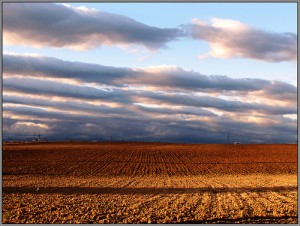A Hollow Passion
I have always been a passionate person. My tendency is not to do anything half way. When I’m happy, then the world is a beautiful place, I have the best friends anyone could possibly imagine, life is worth living, and it will never be any different. Then I become sad, the world’s cruel, all my friends are disappointing, life is a drag, and it has always been that way. And then suddenly the wind blows from yet another direction, and off I go.
It used to strike me that living “passionately” in this way, throwing myself as deeply as possible into each experience, was the only authentic way to really “live” life. (I seem to remember a beer commercial when I was growing up that had the catch phrase “go for the gusto.”) I thought, well, if I’m going to live this life fully and meaningfully and with every ounce of everything I’ve got, then I’ve got to throw myself into each experience with full force. Isn’t that what it takes to be really engaged in this life?
Well, no. I don’t think so, not so much anymore. While I’ve certainly lived a good chunk of my life from that place, I seem to be moving to a different point of view as I age, physically and spiritually. And the change could be described in several different ways.
One way of describing my experience would be the sensation of getting hollowed out, so that I’m more aware of myself as a container for experience and emotion, more aware of a being who holds those feelings, and less inclined to derive identity from what I feel. “I feel” and “I am” are becoming increasingly distinct.
In terms of self-concept, there were plenty of times in life where I would think, “I’m a happy person” or “I’m a sad person” with that kind of “I AM” construction. Now I am still quite aware of having those experiences, happy/sad, but from the bigger perspective of the infinite beings that we are. (If this seems strange to you, the next time you run into a really strong emotion, try shifting from “I AM sad” to “I contain sadness today” or “I am carrying sadness.”)
If those words feel odd coming out of your mouth, just try them on for size a bit; live with them for a few days. Perhaps you will notice a subtle shift in the way you conceive yourself, calling attention to the container, the carrier, which is not just a significant part of you–I would say, from what I understand now, that part *IS* you! You are the carrier and container of what you experience, not merely the experience itself.
A second exercise beyond shifting from “I AM [emotion]” to “I CARRY [emotion]” is to ask the question, “and what else?” Very often when we attach (what I called “clamping down” in last week’s blog) around one emotional state we become very black and white and think that we’re feeling only one thing, but it’s rarely so. In fact, we not only normally feel more than one thing, we feel conflicting things.
People in a marriage may feel that their spouse is cute as a button and annoying as hell. (Yes, at the exact same time. I have done it.) One of the reasons being a teenager is so tough is that you often feel, towards your parent, “I desperately need your love and affirmation” and “I wish you would get out of my life and that I would never have to see you again” simultaneously. No wonder we break out in acne.
 Feeling everything we feel is tough work, but part of that is not getting so entrenched in one feeling that we miss the big picture. From a Zen perspective, it’s a reminder that we are the sky, rather than the weather that moves across the sky. Emotions will move across us and change day to day just like the weather, but there’s a bigger perspective, a larger container, a background. I want to suggest to you that you are not your weather. You are the sky.
Feeling everything we feel is tough work, but part of that is not getting so entrenched in one feeling that we miss the big picture. From a Zen perspective, it’s a reminder that we are the sky, rather than the weather that moves across the sky. Emotions will move across us and change day to day just like the weather, but there’s a bigger perspective, a larger container, a background. I want to suggest to you that you are not your weather. You are the sky.
As I said last week, a diner who puts his head face-first into a bowl of soup is not necessarily tasting his meal any more thoroughly, deeply or carefully than someone who uses a spoon. Being aware of ourselves as great spirits, large vessels, infinite containers of emotion, experience and perspective does not contradict deep engagement with life experiences. On the contrary, it facilitates and supports deeper engagement.
As I age, I find myself giving more attention to the container. Meditative or contemplative practice is one of the ways we build that container bigger, or increase our ability to “witness” what we are experiencing while we are experiencing it.
I do need to close by sending a message back to my inner teenager: yes, I still feel passionate about life. I still live with gusto. I love this life. I feel fully engaged and I’m still interested in tasting every drop of life as it goes by. I just don’t throw myself headfirst into my soup quite as often as I used to. I can actually taste it a little more clearly, and the cleanup isn’t nearly as messy.
There won’t be a blog entry next weekend because I’ll be in the midst of the first Touch Practice weekend retreat with 24 other men. For those of you inclined to hold us in your thoughts or prayers, these would be most welcome. See you in a few weeks.
Have thoughts you’d like to share?
Touch Practice is a sacred practice for me, and part of that is keeping confidences sacred. While a name and e-mail address are required to post a comment, feel free to use just your first name, or a pseudonym if you wish. Your e-mail address will never be seen by or shared with anyone. It is used to prevent spam and inappropriate comments from appearing in the blog. I’d really like to hear from you!














When I think of myself as a container, it helps me be receptive in a conscious way; and as well, I can act with more conscious intention. Thanks for this seed thought.